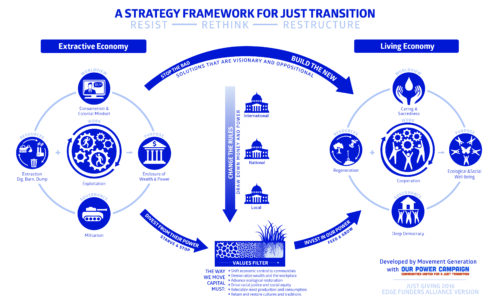A Just Transition Framework
The concept of a “just transition” can be defined as prioritizing the needs of the most vulnerable front-line, indigenous communities, and displaced workers, so that they benefit first from mitigation and adaptation programs that are aiming to eliminate toxic exposure in the work and home environment. A Just Transition framework recognizes that confronting the toxic economy that we live in should not be viewed as merely a technical matter of switching to safer and toxic-free solutions, but also a social and economic shift that ushers in a cleaner, fairer city for all.
CHANGE embraces the principles of a “just transition” to ensure that existing structural inequities are not re-enforced and that a coordinated economic and environmental just transitions protects workers, communities, and creates green jobs. Concretely, a Just Transition prioritizes the creation of green jobs both for workers transitioning out of toxic-intensive sectors (e.g auto body shops, dry cleaners, beauty salons, fossil fuel industries, etc.) and workers seeking the opportunities of a cleaner and solidarity economy. Through this framework, we aim at appropriately engaging front-line communities that have historically faced disproportionate burden of toxic exposure in their work environment as well as structural barriers to good, unionized jobs.

Exposures to Toxic Chemicals Impact your Health
We are exposed to toxic chemicals through the cleaning and personal care products that we use, the air that we breathe, and the
food that we eat. Through bio-monitoring, the science of measuring chemicals in people, we know conclusively that the U.S. population is exposed to hundreds of dangerous chemicals in products that we use every day.
Evidence of Harm
Scientific evidence increasingly links chemicals found in our everyday life to a host of health conditions.
- Childhood and adult cancers: Formaldehyde, benzene, vinyl chloride, ethylene oxide, styrene, trichloroethylene and 1,3-butadiene
- Heart disease: Tobacco, carbon-disulfide
- Learning disabilities: Phthalates (fragrance), Glycol ethers (fragrance)
- Asthma: Phthalates (fragrance) and didecyldimethylammoniumchloride (fragrance)
- Infertility and birth defects: Glycol ethers (fragrance), N-Methyl-Pyrrolidone
- Endocrine Disruption: Bisphenol A, phthalates (fragrance), musk ketone (fragrance), nonylphenol/ octylphenol ethoxylate (fragrance), and alkylphenol ethoxylate (fragrance), atrazine, cadmium (heavy metal)
Policy Recommendations
Most Americans assume that chemicals used in the consumer products we use every day have been tested for safety, and that harmful the chemicals are not allowed on the market. Alarmingly, this is not the case. The federal laws that regulate industrial chemicals are slow- acting and not sufficiently health protective, despite a recent update passed by Congress, the Chemicals in the 21 st Century
Act. In nearly 40 years, the EPA has been able to require testing for only a few hundred of the grandfathered chemicals—and only five have been restricted.
That’s why CHANGE is a coalition of organizations representing health-affected communities, health professionals, environmentalists, environmental justice communities and workers from across the California that aims to support legislation to protect our most vulnerable communities from the disproportionate burden of toxic chemical exposures.
CHANGE advocates for:
- Protect and enforce California’s Prop 65 law, which incentivizes the substitution of carcinogens and reproductive toxics with safer alternatives by enforcing the consumers the right to know about chemical exposures.
- Encourage development of safer alternatives to toxic chemicals through promotion of the Green Chemistry Program, a program that conducts alternatives analysis of chemicals using health and environmental outcomes to require the use of safer alternatives.
- Secure a dedicated funding stream for the California Bio-monitoring Program with a focus on environmental justice communities.
- Pass ingredient disclosure laws for professional and consumer products such as salon products, cleaning products, and fragrances.